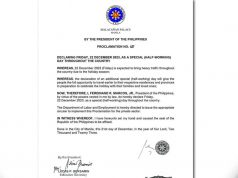Cases of fake news and sextortion will most likely increase in the Philippines this 2019 despite government measures to prevent them, according to a major cyber security firm.
Trend Micro, a global leader in cyber security solutions, released a report titled “Mapping the Future: Dealing with Pervasive and Persistent Threats” in December 2018 that focuses on possible techniques that cyber criminals can employ.
“Cyber criminals will continue to follow a winning formula—exploit existing flaws, social engineering and stolen credentials – to drive profits,” said Ian Felipe, country manager for Trend Micro Philippines.
Filipinos spend an average of three hours and 57 minutes following celebrities and looking at updates on social media sites Facebook, Twitter and Instagram, the firm said.
The report found Filipinos to be among the most vulnerable to sexual extortion or sextortion and the proliferation of false information online.
Fake news
Trends Micro cited a survey from Pulse Asia Research in 2018 stating that nine out of 10 Filipinos are aware of fake news.
The type of technology fake news propagators use, however, is more powerful and even efforts to disprove and counter their content will not be enough.
“The side of technology that allows fake news propagators to sway public sentiment and present itself as legitimate news has become even more powerful, which leads to governments expressing interest in regulating social media platforms,” Trend Micro said.
Since 2018, Facebook, Twitter and news organizations have been fighting this by fact-checking sketchy materials and purging sketchy pages on social media platforms.
In 2019, top universities and various news organizations collaborated to form the first cross-newsroom fact-checking initiative in the country called Tsek.ph dedicated for the upcoming mid-term polls.
Trend Micro mentioned House Bill 5021 or the proposed Social Media Regulation Act of 2017 filed by former House Representative Pantaleon Alvarez as among the measures the government made to reduce fake news.
However, this is still insufficient given the “deluge” of cyber propaganda expected to increase this year coinciding with the campaign season leading to the May midterm elections.
“This proves to be alarming as the same survey showed that half of Filipinos who use the internet for social media have changed their views on government and politics based on what they see online,” the firm said.
Sextortion
Trend Micro also saw the Philippines as “one of the biggest breeding ground” for online extortion through sexual favors this year.
“Even if there is no guarantee that a blackmailer will come through, the highly personal nature of this kind of attacks will make the victim seriously consider fulfilling the attacker’s demands, whether that means money or sexual favors. As sextortion, in particular, becomes more widespread, this kind of attacks will affect, and perhaps even claim, more lives in 2019,” the firm said.
The Philippine National Police Anti-Cybercrime Group or PNP-ACG, along with Interpol, agencies have sought to tear down the large criminal network of sexual blackmail.
Blackmail money normally ranges from $500 to $15,000.
Members of the unit, however, admit in reports that the country is still poorly equipped in fighting all forms of cyber crime including sextortion.
Other predictions
The firm also forecasts that social media accounts of celebrities and personalities on YouTube, Instagram and Twitter to be compromised by phishing attacks.
Merriam-Webster defined “phishing” as a scam wherein the user is duped into revealing personal or confidential information to the perpetrator who may use it for illicit purposes.
“These will shine a light on account security in mainstream media, but not before millions of users following these accounts has been affected by whatever payload the attackers have in store for them,” Trend Micro noted.
Cyber criminals or attackers are also expected to use emerging technologies such as artificial intelligence to target top-level business executives.
“They can use AI to determine when and where corporate executives are expected to be in the future, such as the hotels their companies typically book them in, the restaurants they pick for meetings, and other preferences that can help narrow down their next likely locations,” the agency said.
Furthermore, the Philippines will also be affected with issues related to cloud adoption technology given that the country is among those lagging in cloud infrastructure, according to data from the Cloud Readiness Indez 2018.
“Vulnerabilities found in cloud infrastructure, such as containers, and weak cloud security measures will allow greater exploitation of accounts for cryptocurrency mining, leading to more damaging breaches due to misconfigured systems,” Trend Micro said.










